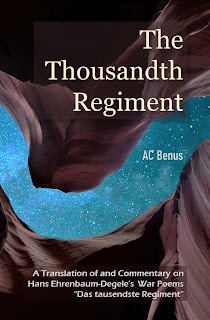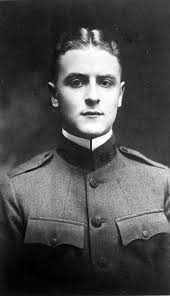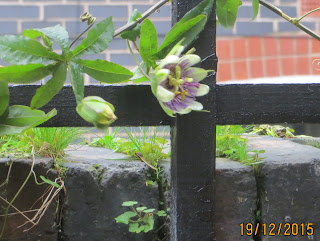I only recently realised that John Buchan - one of my favourite writers - had also written poetry and deserves to be remembered here
 |
| Joh Buchan, WW1 |
Born in Perth, Scotland on 26th August 1875, John’s parents were John Buchan, a Free Church of Scotland Minister, and his wife Helen. John junior was the eldest child and had three brothers - William, Walter and Alastair - and a sister, Anna. Anna Masterton Buchan (24 March 1877 – 24 November 1948) also became a writer and used the pen name O. Douglas.
John grew up in Fife, attending schools in Kirkcaldy. Then in 1888, the family moved to Glasgow, where John’s father was called to serve at the John Knox Church in the Gorbals. After attending Hutcheson's Boys Grammar School, John went on to study Classics at the University of Glasgow in 1892.. In 1895, John won a scholarship to study at Brasenose College, Oxford University, where he met and befriended Thomas Arthur Nelson, grandson of the founer of the Edinburgh publishers.
John married Susan Charlotte Grosvenor in 1907 and the couple had four children.
By the time the First World War began, John’s career continued to be pulled in two directions - the political and the literary. He worked for the publishers Nelsons, in Edinburgh. John fully understood the importance of positive propaganda to the war effort and, with the rank of Lieutenant-Colonel, from 1915, he worked as a war correspondent for “The Times” and “The Daily News” newspapers, sending optimistic reports from the Western Front in France. He became Director of Information at the Foreign Office’s Department of Information (1917-1918) and, for a brief time, Director of Intelligence. He continued to write novels and poetry – “Greenmantle” and “The Thirty-Nine Steps” were written at that time.
Though more famous as a novelist than a poet, the war inspired John to write and publish "Poems, Scots and English" in 1917, a volume that included verse in Scots vernacular.
“POEMS SCOTS AND ENGLISH” BY JOHN BUCHAN ( Thomas Nelson & Sons Ltd., London, Edinburgh & New York 1917) Dedication:
TO MY BROTHER ALASTAIR BUCHAN, LIEUTENANT, ROYAL SCOTS FUSILIERS WHO FELL AT ARRAS ON EASTER MONDAY 1917
John’s brother, Alastair Ebenezer Buchan (b. 1895), a Lieutenant in the Royal Scots Fusiliers, was killed fighting in the First World War at the Battle of Arras on Easter Monday, 9th April 1917 – the same day and during the same Battle that John’s friend Thomas Arthur Nelson was killed. Alastair Buchan was buried in Duisans British Cemetery, Etrun, France, Grave Reference: I. N. 14.
 |
John's Mother, Helen, visiting
the grave of Alastair Buchan in
Duisans, France |
“On Leave” pp. 55 – 58
I HAD auchteen months o' the war,
Steel and pouther and reek,
Fitsore, weary and wauf, —
Syne I got hame for a week.
Daft -like I entered the toun,
I scarcely kenned for my ain.
I sleep! t twae days in my bed,
The third I buried my wean.
The wife sat greetin' at hame,
While I wandered oot to the hill,
My hert as cauld as a stane,
But my heid gaun roond like a mill.
I wasna the man I had been, —
Juist a gangrel dozin' in fits ; —
The pin had faun oot o' the warld,
And I doddered amang the bits.
I clamb to the Lammerlaw
And sat me doun on the cairn ; —
The best o' my freends were deid,
And noo I had buried my bairn ; —
The stink o' the gas in my nose,
The colour o' bluid in my ee,
And the biddin' o' Hell in my lug
To curse my Maker and dee.
But up in that gloamin' hour,
On the heather and thymy sod,
Wi' the sun gaun doun in the Wast
I made my peace wi' God. . . .
• • • • •
I saw a thoosand hills,
Green and gowd i' the licht,
Roond and backit like sheep,
Huddle into the nicht.
But I kenned they werena hills,
But the same as the mounds ye see
Doun by the back o' the line
Whaur they bury oor lads that dee.
They were juist the same as at Loos
Whaur we happit Andra and Dave.-
There was naething in life but death,
And a' the warld was a grave.
A' the hills were graves.
The graves o' the deid langsyne,
And somewhere oot in the Wast
Was the grummlin' battle-line.
• • • • •
But up frae the howe o' the glen
Came the waft o' the simmer een.
The stink gaed oot o my nose,
And I sniffed it, caller and clean.
The smell o' the simmer hills.
Thyme and hinny and heather,
Jeniper, birk and fern.
Rose in the lown June weather.
It minded me o' auld days,
When I wandered barefit there,
GuddHn' troot in the burns,
Howkin' the tod frae his lair.
If a' the hills were graves
There was peace for the folk aneath
And peace for the folk abune.
And life in the hert o' death. . . .
• • • • •
Up frae the howe o' the glen
Cam the murmur o' wells that creep
To swell the heids o' the burns.
And the kindly voices o' sheep.
And the cry o' a whaup on the wing,
And a plover seekin' its bield. —
And oot o' my crazy lugs
Went the din o' the battlefield.
I flang me doun on my knees
And I prayed as my hert wad break.
And I got my answer sune,
For oot o' the nicht God spake.
As a man that wauks frae a stound
And kens but a single thocht,
Oot o' the wind and the nicht
I got the peace that I socht.
Loos and the Lammerlaw,
The battle was feucht in baith.
Death was roond and abune,
But Hfe in the hert o' death.
A' the warld was a grave,
But the grass on the graves was green,
And the stanes were bields for hames,
And the laddies played atween.
KneeHn' aside the cairn
On the heather and thymy sod,
The place I had kenned as a bairn,
I made my peace wi' God.
1916
John Buchan died on 12th February, 1940.
https://archive.org/details/poemsscotsenglis00buch/page/54/mode/2up
According to Catherine W. Reilly, John Buchan’s WW1 poetry collection were:
“Meditations of a country chiel: a collection of verse” (Edinburgh, Bishop, 1918)
“Poems: Scots and English” (Jack, 1917)
“Poems: Scots and English” (new edition – Nelson, Edinburgh, 1936)
He also had a poem or poems published in 2 WW1 anthologies:
“Northern Numbers: representative selections from certain living Scottish poets (Foulis, 1920)
William Robb, Comp. “A book of twentieth-century Scots verse. (Gowans & Gray, 1925). All in Scots dialect.
Sources: Find my Past, FreeBMD, Wikipedia,
Catherine W. Reilly “English Poetry of the First World War: A Bibliography” (St. Martin’s Press, New York, 1978) pp. 22, 25 and 73
https://www.jstor.org/stable/26070692
https://archive.org/details/poemsscotsenglis00buch
https://livesofthefirstworldwar.iwm.org.uk/story/23343
https://www.peeblesshirenews.com/news/17199203.april-9-1917---day-will-forever-haunt-buchan-family/
https://www.cwgc.org/find-records/find-war-dead/casualty-details/168887/alastair-ebenezer-buchan/












.jpg)













_Richard_Aldington_by_Howard_Coster_10_x_8_inch_film_negative,_1931.jpg)








